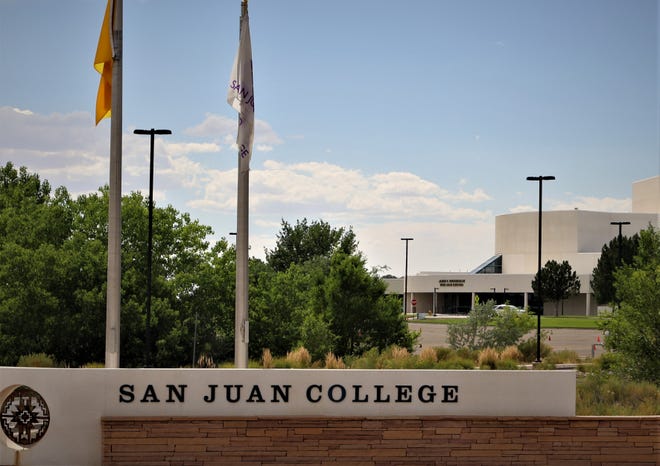San Juan College taking variety of approaches to resumption of classes during pandemic
Use of technology will be key, even in face-to-face classes

FARMINGTON — The start of the fall semester at San Juan College is more than a month away. College officials have worked since late March to piece together a plan for how the campus will reopen as the COVID-19 pandemic persists.
Earlier this week they released the details of a four-pronged approach to the resumption of learning while placing an emphasis on maintaining a safe environment.
Dr. Adrienne Forgette, the vice president for learning, said the college will offer classes in a variety of formats — face to face, traditional online, online live and hybrid. She said a planning team spent four months developing the college's approach.
Members of the team sought input from faculty members and students, and they monitored the effectiveness of the school's remote-learning approach after the campus was shut down.

"We have classes that work really well with distance learning and classes that didn't work well at all," Forgette said of what the team discovered.
Most fall courses will continue to be offered online this fall, according to a press release issued by the college, as part of an effort to offer students flexibility. But the school also is offering live online classes. Their format will be similar to face-to-face classes except that they take place virtually at a set time with an instructor present.
The majority of the face-to-face classes will be held in programs that focus on hands-on learning, according to the press release, including technical education and health care. The size of those classes could wind up being limited to allow the college to maintain social distancing standards mandated in Gov. Michelle Lujan Grishman's public health orders.
Classes that have a laboratory component likely will be divided into two sections, with one section meeting in the classroom while the other meets in the lab before the two sections alternate, the release states.

The college also is trying a hybrid format that will employ face-to-face classes and online sessions.
While technology is an integral part of the remote learning experience, Forgette said it will play an increasingly important role in face-to-face classes, as well. As an example, she cited the automobile repair classes the school offers.
"Our auto shop is looking very different than it did six months ago," she said. "We've increased the (use of) technology in areas that have been the least technology focused. Instead of trying to have every student looking under the hood of a car, we'll have one person with a head camera."
Video from that camera will be projected on a screen that the entire class can see while maintaining social distancing, she said. The same objective will be achieved, but students won't be crowded together in an unsafe manner.
"I think we're going to keep doing things like that," she said. "This has prodded us to innovate in ways we hadn't had to before."
Forgette said that while a lot of colleges and universities around the country already have announced they will offer classes only on an online basis this fall, the others likely will wind up mirroring San Juan College's approach.
"I think it's going to be pretty close to what the majority of institutions do," she said.
Forgette said she hopes any possible confusion over the different models is kept to a minimum, noting the college went to great lengths to keep the planning process transparent and to clarify the language it used for students.

She said students were asked at the end of the spring semester for their thoughts on how the college had responded to the crisis. Even if those students had experienced some issues with the remote learning system, Forgette said, they seemed very understanding about the challenge the school faced in finishing the semester under difficult conditions.
"They said, 'Hey, it's a pandemic — what else could you have done?'" Forgette said. "Most of them were pleased with the involvement and care the faculty showed for students during that time."
That personal connection seemed to be the most important element to students, she said.
"To me, that's totally understandable," she said. "When you're going through something difficult, it makes all the difference in the world if you know somebody's going through it with you."
Forgette also said the college made a concerted effort to assist students with any issues they may have been experiencing away from their classwork, including their living conditions or being able to buy groceries. The idea was for students to feel like they were being supported and cared for, she said.
But even that effort may not be enough to help the college fight off an enrollment decline in the face of the pandemic, Forgette said.
"Our (enrollment) numbers are lower than they were last year at this time," she said. "We're working hard to make up those numbers. But it's possible the numbers will be lower. That would be really disappointing, but you keep doing the best you can."
Even though she believes the college has come up with a good, flexible plan, Forgette said she won't be surprised if officials are forced to modify their approach at some point this fall, given the unpredictable nature of the pandemic.
"We all wish we knew what was going to happen," she said. "It's possible the pandemic will get much worse, and we'll have to send everybody home. … I hope that doesn't happen. I hope we can have a more typical spring semester. I think a lot depends on what happens early this fall."
Online information about the structure of fall classes can be found at sanjuancollege.edu/coronavirus. The college also has resources available to help students with computer and technology needs, as well as assistance with food and necessities at 505-326-3311.
Mike Easterling can be reached at 505-564-4610 or measterling@daily-times.com. Support local journalism with a digital subscription.